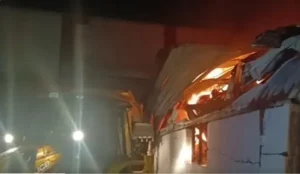This page is Amazing
AI Oversees the Olympics Paris’ New Surveillance System Highlights the Era of Unmanageable CCTV Footage

Add Your Heading Text Here
As the Olympics’ opening ceremony approaches, Paris is heavily fortified with extensive security measures. The city is filled with 40,000 barriers, and police officers in stab vests patrol the picturesque streets. Access to the Seine River is restricted to those who have been pre-approved and issued a QR code. Soldiers, a common sight since the 2015 terrorist attacks, are stationed around the city, armed and vigilant.
French Interior Minister Gérald Darmanin has defended these extensive security arrangements as necessary rather than excessive. He described the situation as the “largest security challenge ever faced by a country in peacetime,” emphasizing the threat posed by various groups. Darmanin revealed that numerous individuals with potentially dangerous affiliations have attempted to join the Olympics workforce or volunteer, including 257 radical Islamists, 181 far-left extremists, and 95 far-right individuals. Additionally, he announced that a Russian national had been arrested on suspicions of planning significant acts of destabilization during the Games.
Parisians are voicing frustration over road closures and bike lanes that end abruptly, while human rights groups are criticizing the situation as posing “unacceptable risks to fundamental rights.” Such complaints about heavy-handed security measures are a recurring theme at the Olympics. Past Games have seen similar concerns, with London labeled Lockdown London, Tokyo described as Fortress Tokyo, and Rio facing an “arms race” in security. This time, the most contentious aspect is the use of advanced AI technology. Paris has introduced a new AI system that analyzes CCTV footage from transport hubs to detect potential threats. This system was initially trialed in Paris in March during two Depeche Mode concerts.
Add Your Heading Text Here
For both critics and proponents, the use of algorithms to monitor CCTV footage represents a glimpse into future security systems, where human operators cannot possibly review all the surveillance footage manually. Noémie Levain from the activist group La Quadrature du Net, which opposes AI surveillance, describes the technology as an extension of the police force, equating it to “the eyes of the police multiplied.”
At the Porte de Pantin metro station entrance, surveillance cameras are mounted on the ceiling inside discreet gray metal boxes. Above a nearby trash bin, a small sign informs passersby that they are part of a “video surveillance analysis experiment.” The sign notes that RATP, the company managing the Paris metro, is “likely” to employ “automated real-time analysis” of the CCTV footage that might include their images. It also states that this experiment will continue until March 2025.
Porte de Pantin is situated near La Villette park, which will host the Olympics’ Park of Nations, featuring pavilions for 15 different countries where visitors can eat and drink. This metro station is one of 46 train and metro stations where CCTV algorithms will be used during the Olympics, as announced by the Prefecture de Paris, part of the interior ministry. City officials did not respond to WIRED’s inquiries about the potential use of AI surveillance beyond the transport network. According to a March 2023 law, these algorithms are permitted to scan CCTV footage in real-time for eight specific “events,” including crowd surges, large groups of people, unattended items, weapons, or individuals who have fallen.
Share this post :

Thane Professor Sentenced to 3 Years for Harassing MBBS Trainees

Zakir Hussain Family Requests Prayers and Clarifies False Death Reports
KTR Accuses Revanth Reddy’s Brother-in-Law of Securing Lucrative Government Contracts with Minimal Business Background
NASA says: Two Big Space Rocks To Dangerously Flyby Earth Today
Subscribe our newsletter
Purus ut praesent facilisi dictumst sollicitudin cubilia ridiculus.

Thane Professor Sentenced to 3 Years for Harassing MBBS Trainees







